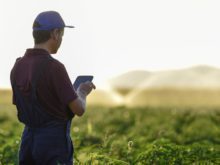Precision agriculture
Precision agriculture comes to rescue, as a strategy for managing agricultural activities able to make conscious and efficient choices.
Combining quality production that responds to the challenges of the planet and the protection of the environment is an activity that requires efforts, but above all, data and metrics, that are able to direct a strategy that reduces waste and takes into account several factors.
Precision agriculture comes to rescue, as a strategy for managing agricultural activities able to make conscious and efficient choices.
What is precision agricuture?
Using a past definition, we can define precision agriculture as "a system that provides the tools to do the right thing, in the right place, at the right moment" (Pierce, F. J., & Nowak, P. Aspects of precision agriculture. Advances in agronomy. 1999).
We can also define it as a strategy for the management of agricultural activity that, through the data collection, guides future decisions according to the elaboration and interpretation of this.
These reasoned choices are intended to bring not only economic benefits, but also in terms of production efficiency, product quality and environmental impact.
Precision agriculture: benefits
We could summarize the benefits of precision farming in this way:
- Input optimization,
- Facilitation of field operators: reducing fatigue, execution time, repetitive tasks,
- Controlled resource distribution, such as water, fertilizers, or pesticides,
- Creation of databases to facilitate future consultation and rationalise actions,
- Reduction of water consumption for irrigation,
- Reduction of pressure from agricultural systems on the environment,
- Reduction of chemical infiltration into groundwater.
Among the benefits: localized fertilization
Among the many benefits as a strategic farming management entail, localized fertilization also holds an important place.
In fact, locating fertilizer means first having a reduced impact on the environment. It also means substantially reducing the risks of leaching, percolation, and volatilisation losses.
Localizing also allows to reduce the time dedicated to sowing and fertilization operations, thus avoiding double labour, waste and/or excessive use of the product.

